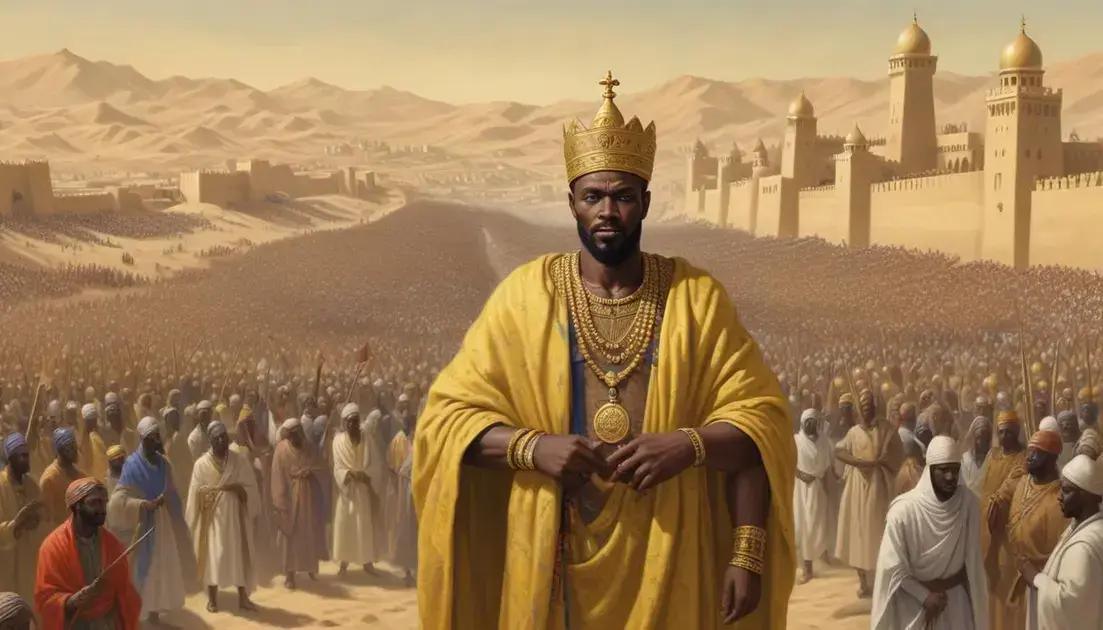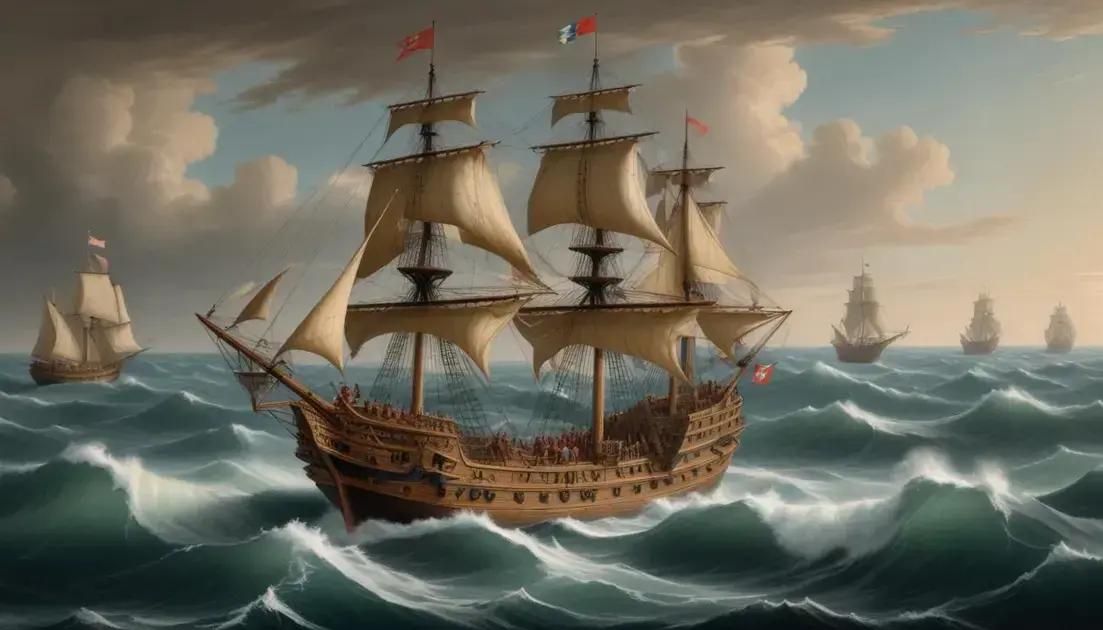
Mansa Musa and the Wealth of the Mali Empire
Mansa Musa, the famed ruler of the Mali Empire in the 14th century, is celebrated for his immense wealth and influential reign. His pilgrimage to Mecca showcased the riches of Mali, impacting trade networks globally. Musa’s commitment to education and culture transformed Timbuktu into a prominent center for learning, while his generous acts established lasting economic and cultural ties. Overall, Mansa Musa’s legacy continues to inspire as an example of power used for the greater good, illustrating the importance of generous leadership and education in building a prosperous society.
Mansa Musa, the legendary ruler of the Mali Empire, is not just a historical figure; he’s a symbol of wealth and prosperity. His epic pilgrimage to Mecca showcased not only his personal riches but also the immense resources of an entire empire. Ready to dive into his story?
Introduction to Mansa Musa
Mansa Musa was the 14th-century king of the Mali Empire in West Africa. He was famous for his wealth and generosity. His lavish pilgrimage to Mecca in 1324 showed the world just how rich the Mali Empire was. People couldn’t believe the amount of gold he brought with him.
Mansa Musa’s Early Life
Mansa Musa was born around 1280. He was part of a royal family. As a young man, he learned a lot about leadership. When his brother, the previous king, died, Musa became the emperor.
The Wealth of the Mali Empire
The Mali Empire was rich in resources, especially gold. Musa controlled large gold mines. This made the empire one of the wealthiest in the world at that time. The trade of gold helped connect Mali to other regions.
The Impact of His Pilgrimage
During his pilgrimage, Musa gave away gold along the way. He made a big impression in cities like Cairo. His generosity helped put Mali on the map. People began to learn more about the great wealth and culture of his empire.
Legacy of Mansa Musa
Mansa Musa’s reign is remembered for both his wealth and his kindness. He helped promote education and the arts. Under his rule, Timbuktu became a famous center for learning and culture.
Today, Mansa Musa is seen as a symbol of prosperity and success. His story shows how powerful and influential the Mali Empire was in history.
Mansa Musa’s pilgrimage to Mecca
Mansa Musa’s pilgrimage to Mecca in 1324 is famous for its extravagance. He traveled with a large caravan filled with gold and supplies. This journey was a religious duty and a display of wealth.
The Journey Begins
Musa left Mali with thousands of people. His group included soldiers, servants, and scholars. They traveled across the desert for many months. The journey covered about 3,000 miles.
Musa’s Generosity
As Musa traveled, he shared his wealth. He gave gold to the poor in towns along the way. When he reached Cairo, he spent so much gold that it affected its value. This showed how wealthy the Mali Empire was.
Impact of the Pilgrimage
His pilgrimage brought attention to Mali. People in Cairo and other cities heard about his riches. It opened new trade routes and strengthened ties with other regions.
Religious Significance
This journey was not just about wealth. Mansa Musa wanted to fulfill his religious duty. He visited the holy sites and prayed. This made his pilgrimage even more meaningful.
Today, Musa’s pilgrimage is seen as a legendary event. It highlighted the importance of faith and the greatness of the Mali Empire.
Impact of Mansa Musa’s wealth on the medieval world
Mansa Musa’s wealth had a huge impact on the medieval world. His riches brought attention to Africa and the Mali Empire. They changed how people viewed the continent’s resources and culture.
Boosting Trade
Musa’s wealth helped develop trade routes across Africa and beyond. Merchants from different regions wanted to trade with Mali. They exchanged gold, salt, and other goods. This brought more prosperity to the empire.
Changing Economics
When Musa visited cities like Cairo, he spent a lot of gold. This caused gold values to drop temporarily. It showed just how powerful and influential he was in the economy.
Spread of Knowledge and Culture
With wealth, Musa invested in education and culture. He built schools and libraries in cities like Timbuktu. Scholars from far and wide came to learn, which helped spread knowledge immensely.
Legacy of Influence
Mansa Musa’s influence extended beyond his reign. His ability to connect with different cultures made Mali a respected empire. Many rulers later looked to him as a model of leadership and generosity.
His wealth truly changed the medieval world, making it more interconnected and culturally rich.
Gold trade in the Mali Empire
The gold trade was a major part of the Mali Empire’s wealth. Gold was a valuable resource, and it boosted the empire’s economy. Mali was one of the richest regions in Africa during this time.
Key Gold Resources
The empire had many gold mines that produced a lot of gold. These mines were located in places like Bambuk and Bure. The wealth generated from gold mining made Mali famous.
Trade Networks
Mali connected different trade routes across Africa. Merchants traveled long distances to trade goods. They exchanged gold for salt, cloth, and other items. This helped the empire grow rich and powerful.
Influence on Global Trade
Mali’s gold also attracted traders from Europe and Asia. They wanted to buy gold and other resources. This made Mali important in global trade networks, changing how commerce worked.
Economic Impact
The wealth from the gold trade allowed Mansa Musa to improve his empire. He built schools, mosques, and roads. This investment in infrastructure benefitted everyone in the empire.
Gold trade not only made Mali wealthy but also connected different cultures. This trade shaped the history of West Africa and beyond.
Legacy of Mansa Musa and the Empire
Mansa Musa left a powerful legacy for the Mali Empire and beyond. His reign changed how people viewed Africa and its wealth. He is remembered as one of the great leaders in history.
Promotion of Education
Musa valued education and built many schools and universities. Timbuktu became a center for learning. Scholars from across Africa and the Middle East came to study there.
Cultural Influence
His wealth allowed him to support the arts and architecture. Beautiful mosques and buildings were constructed during his reign. These structures showcase the empire’s rich culture and art.
Economic Development
Mansa Musa’s gold trade boosted the Mali economy significantly. His focus on trade routes helped the empire flourish. This economic growth set the stage for future wealth.
Historical Impact
Even today, Mansa Musa is a symbol of wealth and generosity. His story inspires many leaders around the world. The legacy of the Mali Empire remains significant in African history.
Overall, Mansa Musa’s reign marked an important period that influenced education, culture, and trade.
Conclusion
In conclusion, Mansa Musa’s reign truly changed the course of history for the Mali Empire and the world. His wealth led to incredible advancements in education, culture, and trade. By investing in these areas, he not only improved his empire but also left a legacy that inspires generations.
The impact of Mansa Musa’s generosity and leadership is still felt today. His story shows the importance of using wealth for the greater good. Investing in education and culture can bring lasting benefits to society. Ultimately, Mansa Musa’s life teaches us about the power of vision and the importance of helping others.


